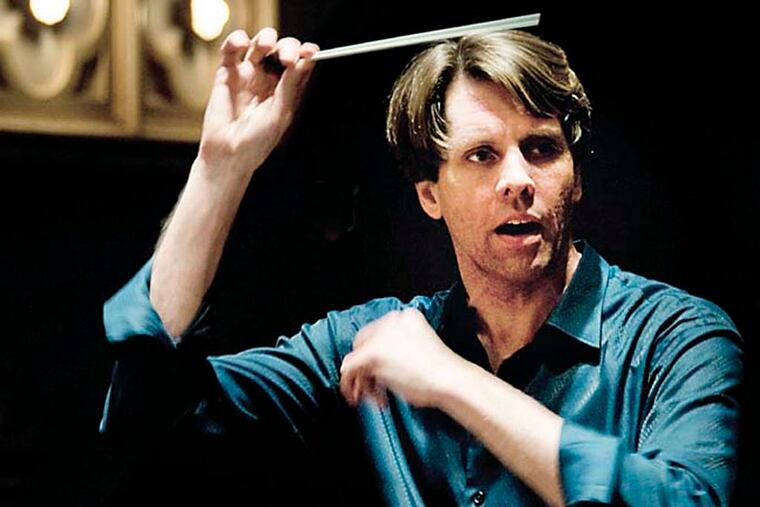This orchestra is going into business
With more orchestras declining than thriving, classical music audiences can be forgiven for thinking the brand new Pennsylvania Philharmonic is a mirage.

With more orchestras declining than thriving, classical music audiences can be forgiven for thinking the brand new Pennsylvania Philharmonic is a mirage.
Only 10 months after it entered the talking stage, the ensemble makes its debut Saturday in a splashy Ravel/Gershwin program with star pianist Simone Dinnerstein at Pottstown High School, then fans out to West Chester, York, Bethlehem, and beyond - places that can't always support a professional group.
"All the ducks have lined up so quickly. . . . Orchestras usually plan at least two years in advance," said Michael Butterman, the ensemble's recently hired music director.
"I think it's fabulous," Dinnerstein said. "I have such admiration for someone with the chutzpah to start an orchestra. It's not just educating children, but people who are my age, in their 30s and 40s, who stopped going to concerts."
Or maybe never attended to begin with. The new orchestra's mandate is primarily educational, playing concerts in schools; the performances with Dinnerstein are only its most public activity.
"There's a huge gap in the cultural life of this community - and in the tri-county area" encompassing parts of Chester, Montgomery, and Berks Counties, said Myra Forrest, executive director of the Foundation for Pottstown Education. "It's not that there's nothing going on here musically. . . . but a fully professional orchestra is something the students don't see any longer. And it's something they need to see, feel, and touch."
The inaugural concert's Pottstown location is significant: The town had an excellent professional orchestra that performed at the high-toned Hill School until it folded in 2008. The Pennsylvania Philharmonic will play at the high school's 1,200-seat Stanley I. Davenport Center for the Performing Arts.
Each season will have four or more concentrated periods of activity, possibly expanding to communities such as Norristown or Coatesville. The model involves ongoing partnerships with schools, which supply performance and rehearsal venues and have convenient access to school educational concerts. Free tickets to the public concerts will go to older students.
Remarkably, this orchestra with a budget under $1 million has 62 musicians for educational concerts and 71 for public ones.
"The music director would want three or four more, and I would like three or four less, but we compromised," said M. Scott Robinson, the hearty founder and chief executive who devised the plan at the end of his 12-year tenure running the Lancaster Symphony Orchestra.
His maneuvering is impressive. Robinson tried to stay away from concert dates with other regional orchestras to accommodate the best Philadelphia- and Baltimore-area freelancers he could find. Those dates also accommodate conductor Butterman, who has commitments with four orchestras from Jacksonville, Fla., to Shreveport, La., and Dinnerstein, whose schedule has her playing seven different concertos this month.
Robinson tapped Butterman partly because of his history of interactive educational concerts, his primary activity with the Rochester (N.Y.) Philharmonic. The Dinnerstein connection came from his collaborations with her at the Boulder (Colo.) Philharmonic. No stranger to Pennsylvania, Dinnerstein launched her career through Astral Artists in Philadelphia and is now a popular Sony Classical recording artist.
In her private life, Dinnerstein runs a series of school concerts in her hometown of Brooklyn, but when time allows augments her performances on tour with what she calls "Bach Packing" concerts, in which she goes right into school classrooms to allow the music to be experienced at extremely close range. "The whole idea of performing is something I've been thinking a lot about," she said. "What's the purpose of it?"
One answer is outreach. "Many of the students come from homes where education isn't revered, and there's not enough money for music lessons or sports camps," Forrest says. "Here, it's the job of the schools to expose their children to these things."
Saturday's program features Gershwin's Rhapsody in Blue - to Dinnerstein not a pops warhorse, but a piece with a symbiotic relationship with Ravel's Concerto in G, also on the program. Titled "Fascinatin' Rhythms," the program is filled out by Copland's Four Dances From Rodeo and begins with Fanfare Ritmico by Philadelphia composer Jennifer Higdon.
Urban renewal is also a potential component of the concerts. "Lancaster was a sleepy community when I first went there [12 years ago], but the arts have played a significant role in letting the downtown blossom again," Robinson says. "These third-tier cities have a lot going for them. And all they might need is the energy and spark to rekindle them."
Of course, acoustics are the wild card in these school venues - one reason the classical program comes with an extra sound check.
"Building an orchestra from the ground up with community engagement being the driving force . . . is very appealing, but also a bit of a blank slate. We have to experiment and try things out," Butterman said. "Also, it's an opportunity to work with musicians in a part of the country in which I haven't spent much time. I have a feeling I'm going to be pleased by the artistic level that they can rise to."
MUSIC
Pennsylvania Philharmonic
7:30 p.m. Saturday at Pottstown High School,
750 N. Washington St., Pottstown. Tickets: $45. Information: 717-368-5143 or www.paphilharmonic.org.EndText